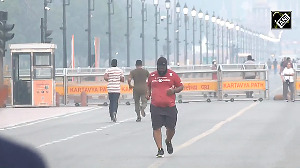'What steps have the higher level of political leadership taken to remove corruption from the system and bring in honest governance?'

Former Indian Administrative Service officer M G Devasahayam believes Mission Karmayogi, the Modi government's initiative to reform the bureaucracy is nothing but a jumla.
- Part 1: 'Mission Karmayogi is a jumla'
In the concluding segment of his interview to Shobha Warrier/Rediff.com, the 1968 batch IAS officer, who was commissioned in the Indian Army in 1964 and took part in the 1965 War and counter-insurgency operations in Nagaland in 1967-1968, asks, "By concentrating all powers and decision-making in the PMO, the Government of India has been destroying whatever independence and autonomy left in the institutions and instruments of democratic governance manned/headed by civil servants."
The government says the ultimate aim of Mission Karmayogi is to make ease of living for the common man, and ease of doing business for business people.
See, the problem they are talking about takes place at the lower level, at the departmental level. They delay files to make money.
For example, when somebody wants a community certificate, somebody wants a patta, or want to get business/industrial approvals he doesn't go to a politician, he goes to a lower level official. Politicians are not present in the day to day administration.
Government of India officials for whom Mission Karmayogi is meant, do not come into contact with these people.
They are talking about proactive and polite, professional and progressive, energetic and enabling, transparent and tech-enabled, creative and constructive, demonstrative and innovative.
I would say, the lower level of bureaucracy does not need most of these characteristics. They only need honesty and integrity to work and deliver quality service.
What is the point if you may have all those characteristics, but you are dishonest and corrupt? That's why I am saying, they have not addressed the real issue.
If you do not have ease of doing business, it is because you are dealing with corrupt people.
What steps have the higher level of political leadership taken to remove corruption from the system and bring in honest governance and governance with integrity?
What honesty and integrity you can talk about when you are openly buying MLAs to form governments?
What kind of example are you setting with PM-CARES Fund with huge public/government contributions that is completely opaque, non-accountable and non-auditable?
Now, the government wants to recruit thousands of people through lateral entry. Why? They want to induct corporate employees into the bureaucracy and create a corporate State. This is the whole objective of this Mission Karmayogi.
Another argument that is going around is that the country should have technocrats to take care of special departments and not bureaucrats.
This was an argument during our times, not anymore. During our times, the bulk of the civil service was from the humanities stream. I myself am a student of economics. There was hardly any place for technocrats in those days.
Then, they relaxed it for engineers, and people who studied in the IITs also started joining the service. After that, medical fraternity also came in.
Now, most of the senior civil servants are technocrats. What's the problem when you have engineers from the IITs, management graduates from IIMs and doctors as civil servants?
Yes, the problem is placement; they should be placed based on their qualifications. I think you should have a separate cadre for these technocrats because there is a large number of them in service.
So, the argument is no longer valid.
 When you have such technocrats, you don't need lateral entry, you don't need to recruit from the market.
When you have such technocrats, you don't need lateral entry, you don't need to recruit from the market.
During our times, lateral entry was needed to a limited extent, and that was how leading technocrats came in. That was because there were no technical people within the IAS then.
Today, bulk of the IAS are technical people and they are groomed from the beginning. And because we start at the grassroot level, we know the villages, grassroot democracy and grassroot economy.
From there, we move to the state government and then at the central level where bureaucracy from all states reach.
So, the bureaucracy working at the central level has the grassroot experience of every district and state. And that is the ethos of the founding fathers.
But when you recruit laterally from the corporate, what do they know about India?
What do they know about the villages?
What do they know about a population reeling in poverty? They might have worked in some corporate offices in Mumbai, Delhi or Chennai and not in any villages.
What is happening is, the government is trying to bring in lateral entry and creating a smokescreen by saying this scheme is for 46 lakh people.
God alone knows which 46 lakh people they are talking about. All this is showmanship.
Would you say Mission Karmayogi should be for the political class first and not the civil servants?
They are saying that Mission Karmayogi will produce civil servants who would be creative, constructive, imaginative, innovative, proactive, professional, progressive, energetic, and enabling.
In fact in the last few years, by concentrating all powers and decision-making in the PMO, the Government of India has been doing just the opposite by destroying whatever independence and autonomy left in the institutions and instruments of democratic governance manned/headed by civil servants, past and present.
That is one more reason why I call this a jumla!
As it is, civil servants/bureaucrats are bound by rules, regulations, qualifications and procedures at every level, whether it is recruitment, appointment, confirmation, promotion, disciplinary action and retirement. There is also some sort of training at regular intervals.
There is no such thing for the political cadre or leaders. So, if at all you want to have Mission Karmayogi, it should first be applied to the entire political class.
I am not saying you should not include the bureaucracy. First, you do it for the entire political class of ministers, MPs and MLAs, and the party office-bearers. Make them Karmayogis first.
Then you can bring in civil servants, and before that allow them to function independently with a fair amount of freedom and decentralisation of authority and decision making.











